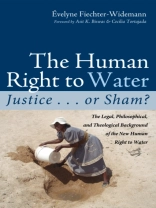Water is a matter of life and death. Advanced technology and engineering enable humans to gain better access to it. Nonetheless, the conditions and effort required to reach this goal remain colossal in many countries. Building a lasting infrastructure for adequate treatment before and after use is costly. Therefore, the author believes that a radical change of thinking among people around the world, from the domestic to the large-scale users, becomes a priority. Even if the United Nations entitles all people to justice for water, more responsible and ethical use of it by all interested parties is more important than the spreading of promises, which, in practice, may turn out to be a sham. Only a better understanding that access to water rests on the efforts of everyone, without exception, will reduce overuse, waste, and pollution of the indispensable resource.
This volume, while written from a theological, philosophical, and legal perspective (focusing on John Calvin, John Rawls, and Paul Ricoeur), demonstrates that water cannot be merely understood as a human right, but also has to be dealt with from an economic point of view as well as under the authority of the Golden Rule.
Over de auteur
Evelyne Fiechter-Widemann, hon. attorney at law, completed a Ph D in Theology at the Theological Faculty of Geneva, Switzerland, in 2015. She holds a Master’s of Comparative Jurisprudence (MCJ) from New York University. She served as a deputy judge on a commission of the Administrative Court of Geneva (CRUNI) and taught Swiss and international public law at the College de Geneve. She has served as a member of the board of a Swiss international relief organization (EPER/HEKS).







![Hoes van Brian Schrag & Julisa Rowe: Community Arts for God's Purposes [Chinese] 貼近神心意的社群藝術 Hoes van Brian Schrag & Julisa Rowe: Community Arts for God's Purposes [Chinese] 貼近神心意的社群藝術](https://static.worldofdigitals.com/thumb_webp/740/9781645083740.webp)




